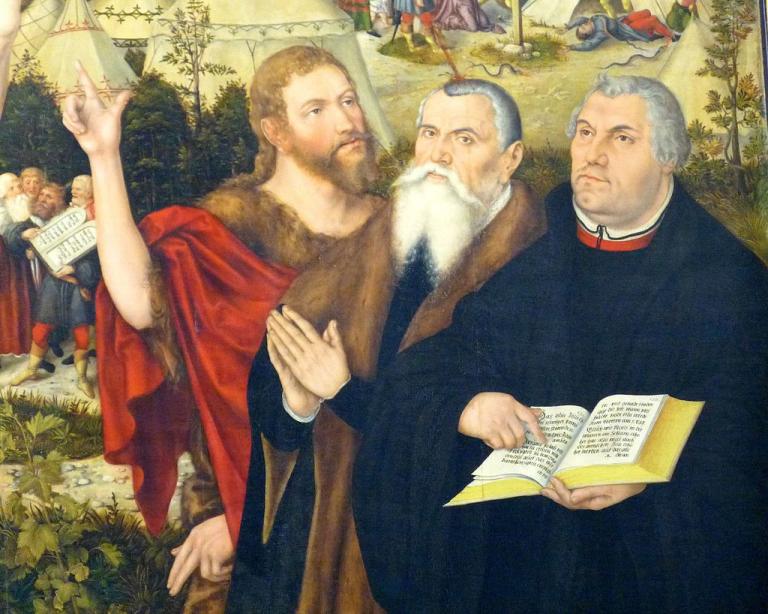Christians have long struggled with the competing claims of faith and good works. Luther cuts the Gordian knot by making a simple, but profound, distinction: Faith must be directed to God, and good works must be directed to our neighbors.
Luther’ neighbor-centered ethic is foundational to his doctrine of vocation. To summarize: We are not saved by our good works, and works that we think we are doing for God–such as rituals, acts of asceticism, or other attempts to curry favor with Him–are not “good,” strictly speaking, at all, unless they actually help someone. Our salvation is based solely on the grace and forgiveness of God, which we receive by faith in Christ and His atoning sacrifice. Whereupon God sends us into the world and calls us into our vocations, where our faith bears fruit in love and service to our neighbors. In the words of the liturgy, which dismisses us after our faith is strengthened by God’s Word and Sacraments, we go out to live our lives “in faith toward You and in fervent love toward one another.”
Luther explores these teachings, through a number of Biblical texts, in his sermons, particularly the ones collected in his Church Postils, sent throughout the Reformation churches for local pastors to preach themselves, thus spreading the teachings of the evangelical theology. So what Luther teaches here about vocation, ethics, and other topics, had wide currency and became quite influential among ordinary Christians.
Here are some excerpts on this topic from a wonderful online source, Martin Luther’s Writings: Sermons, Commentaries, & Other Writings.
God Does Not Need Your Works, but Your Neighbor Does
Here Luther develops his well-known distinction. He does so in an exposition of the Parable of the Unforgiving Servant, which he relates to the Gospel (how God forgives us) and to the Christian life (how Jesus sends those whom He has loved and forgiven to likewise love and forgive their neighbors).
From Martin Luther’s Sermons, TWENTY-SECOND SUNDAY AFTER TRINITY. [1st series] Text: Matthew 18:23-35. [The Parable of the Unforgiving Servant]:
- This is what we have often said, that we Christians must break forth, and show by our deeds and before the people that we have the true faith.
God does not need your works, he has enough in your faith. Yet he wants you to work that you may show thereby your faith to yourself and all the world. For God indeed sees faith, but you and the people do not yet see it, therefore you should devote the works of faith to the benefit of your neighbor. Thus this servant is an example and picture of all those who should serve their neighbor through faith. . . .
- But you say: Do you still insist that God will have no regard for our good works, and on their account will save no one? Answer: He would have them done freely without any thought of remuneration; not that we thereby obtain something, but that we do them to our neighbor, and thereby show that we have the true faith; for what have you then that you gave him and by which you merit anything, that he should have mercy on you and forgive you all things that you have done against him? Or what profit has he by it? Nothing has he, but that you praise and thank him, and do as he has done, that God may be thanked in thee, then you are in his kingdom and have all things that you should have. This is the other part of the Christian life, which is called love, by which one goes out from God to his neighbor.
You Live to Carry in the Sick Man
In his sermon on those who brought the sick man to Jesus, Luther also develops the notion that an important way we love and serve our neighbors is to bring them to Jesus, so that they too will have faith. This is what we do, Luther says, when we bring an infant to baptism. Luther disagrees with those who teach that an infant is baptised on the basis of his parents’ faith or on a faith that the child will have in the future. He teaches that infants can have faith of their own. Baptism bestows that faith, which must be fed by God’s Word throughout the Christian’s life. “So I do not baptize the child in my own faith or in the faith of Christendom. But my faith and Christendom bring the child to baptism, in order that by rightly bringing it God may give it a faith of its own, that it may believe as I believe and be preserved in the same Word that Christ has given me” (paragraph 27).
From Martin Luther’s Sermons, NINETEENTH SUNDAY AFTER TRINITY. [1st series] Text: Matthew 9:1-8. [The healing of the man sick of the palsy]:
- But the kingdom of Christ consists in this and thereby grows, namely, that the conscience be comforted with the Word. What else takes place through works and laws, all pertains to our neighbor. For I need no works before God, and must only be careful rightly to confess my sins. Then I have forgiveness of sins and am one with God, all which the Holy Spirit works in me. Then I break forth with blessings toward my neighbor, as they did here who brought the man sick with the palsy to the Lord. Those were in the kingdom, or show who are in the kingdom, as the Evangelist says, that the Lord had respect unto their faith. For had they not had any faith, they would not have brought the sick to the Lord. Faith precedes works, works follow faith. Therefore, because they are in the kingdom by faith, they bring in the sick man and thus do the work.
- On this earth man lives not for the sake of works, in order that they may be profitable to him, for he is not in need of them. But if you do good works in order thereby to obtain and merit something from God, all is lost, and you have already fallen from this kingdom. But since you believe and continue to live you ought to know that you live for this very cause, namely, to carry in the sick man. God does not desire the Christian to live for himself. Yea, cursed is the life that lives for self. For all that one lives after he is a Christian, he lives for others. So these also do who bring in the sick man, they no longer live for themselves, but their lives serve others; yes, with their faith they win for the sick man a faith of his own. For this sick man had at first no faith, but after he heard the Word, Christ instills into him a faith of his own, and awakens him with the Gospel; as he is accustomed to instill faith by the Word.
Luther on the Benedict Option
I think highly of Rod Dreher’s Benedict Option, with some reservations, as I say in my review of that book. While I agree about the depravity of contemporary culture and the need for Christians to offer something better, I have problems with Christians withdrawing from the world, following the model of monasticism. In this sermon, Luther discusses Jesus’ prophecy of the destruction of Jerusalem, with an excursus on the papacy and the Last Days. In doing so, he also refers to the fall of Rome and the rise of monasticism, St. Benedict style. He maintains that Christians must not flee to the “wilderness” when tribulation comes, but should “move freely in public society.” To flee to the wilderness, as the monastics do, is to undermine our vocations in the world, deprive the world of our witness, and suggest that some Christians are better than others.
From Martin Luther’s Sermons, TWENTY-FIFTH SUNDAY AFTER TRINITY. [2nd series] Text: Matthew 24:15-28. [On the Destruction of Jerusalem and the Last Days]:
- At the time of the holy fathers, Anthony and others, shortly after the Apostles, the fallacy already arose, of which Christ is speaking here, although Anthony strove against it, that everybody was running to the wilderness by the thousands, and it gained such favor that later Jerome and Augustine almost worshipped custom, and did not know how sufficiently to praise it. Now when we look at it in the right light, this text powerfully opposes that movement, and there were also among them many heretics and many condemned persons, and although there were godly people among them who escaped the deception, nevertheless the example was dangerous and cannot be commended. Also St. Francis was a holy man, but his example and the order he established we are not to follow. But this no one, not even the saints, has recognized; so deeply and with such great display has it taken root. The Christian life is not confined to the wilderness, but moves freely in public society as Christ and the Apostles lived, that we come before and among the world, preach and admonish openly, to bring the people to Christ; but the people who run to the wilderness, do not want to remain in the world where they must suffer so much. They choose for themselves their own strict life, want thereby to be better Christians than others, as also the cloisters do.
HT: Jackie
Illustration: Detail from the Weimar Altarpiece by Lucas Cranach (John the Baptist, Cranach, and Luther) via Wikimedia Commons.














